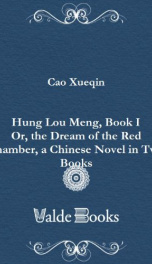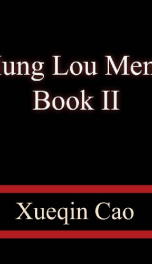Hung Lou Meng, Book I

Cao Xueqin was a man of many facets: a painter, skilled calligrapher, craftsman, healer and poet; however he is best remembered today as the author of the greatest novel written in the Chinese language, Hung Lou Meng (or Dream of the red Chamber). This work had a lot of followers in later Chinese literature, signifying a new period of a classic Chinese novel. It tells of life of several generations of a large aristocratic family, beginning with their rise and following the events and tragic love of the heroes up to the decline of the family. Being a peculiar all-embracing, encyclopedic work, the book is valuable for its detailed account of life and traditions of the Chinese society of the eighteenth century, presenting unique national features, customs and manners. The plot involves hundreds of characters, representatives of various strata of society; the author pays great attention to the inner world of the heroes, emotions and feelings, their state of mind and relations. It is bases on Buddhist idea – life is a dream, full of sorrow and suffering: heroes struggle for their dignity and respect regardless of class representation. The complexity of composition, psychological validity of characters’ action, poems that are skillfully interwoven into the thread of the narration – all these make up cogent literary value of the work, a masterpiece of Chinese, and world literature. The first volume covers chapters I – XXIV.
Info about the book
Author:
Series:
Unknown
ISBN:
1414281358
Rating:
1/5 (40)Your rating:
0/5
Languge:
English
Users who have this book
Users who want this book
What readers are saying
What do you think? Write your own comment on this book!
write a commentif you like Hung Lou Meng, Book I try:
Other books by this author
Do you want to read a book that interests you? It’s EASY!
Create an account and send a request for reading to other users on the Webpage of the book!


